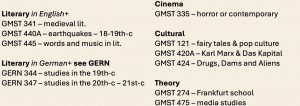Winter Session 2024/25 Courses
GMST 121: Fairy Tales and Popular Culture | SYLLABUS
Term 2 | in-person | M/W 12:30 – 14:00 | 3 credits
Explore folk and fairy tales from the German-speaking tradition and their adaptations.
gMST 274: The Frankfurt School | sample syllabus
Term 1 | in-person | M/W 9:30 – 11:00 | 3 credits
How did György Lukács’ quip about German intellectuals residing at the “Grand Hotel Abyss” become part of the grand narratives of the Frankfurt School tradition? This course will examine key texts by the founding members of the Frankfurt Institute of Social Research, their collaborators, critics, readers and followers. The focus will be on their engagement with art, technology and popular culture, as well as the Marxist critique of ideology and mass media before the digital turn.
GMST 335: German Cinema
Terms 1 or 2 | various times | 3 credits
Screening, discussion, and critical analysis of influential cinema from German-speaking societies from the silent era to the 21st century.
Sample Syllabi: Germanic Horror Films, German Cinema, sYLLABUS
GMST 341: Medieval german literature | SAMPLE SYLLABUS
Term 1 | multi-access | Tues/Thur 15:30 – 17:00 | 3 credits
Germanophone literature of the Middle Ages, Renaissance, and Baroque against the larger background of the political and social developments of the period.
GMST 420A: Studies in Modern German-speaking Culture | syllabus
Term 2 | in-person | M/W 9:30 – 11:00 | 3 credits
Questioning dogmatic assumptions about ‘Marxism’, ‘socialism’, and ‘historical materialism’, this course examines how Marx’s critique of political economy in his masterpiece, Capital, was itself criticized and creatively read by intellectuals in a variety of disciplines since the late 19th century. We’ll consider how Marx’s classic ideas about the commodification and mechanization of culture (Benjamin and Lukàcs), class conflict and social discipline (Simmel and Weber) have been revised and expanded by feminist, queer, post-structuralist, and ecological critics to account for the racialized, gendered, sexualized, and colonial character of capitalist exploitation on multiple scales. CENS 201: Capital and Contexts is recommended, but not required!
GMST 424: Selected Issues in German-speaking Culture | SYLLABUS
Term 2 | in-person | Tues/Thurs 9:30 – 11:00 | 3 credits
Cross-listed with GMST 521. The course will concentrate on a strange mix of conspiracy theories and outlandish mega-projects that emerged in the early 20th century. Some were ridiculous, some explicitly genocidal; some have disappeared, others are still with us or have recently returned. We will discuss their cultural and historical origins and how they are related to totalitarian visions of control and a radical reconstruction of the world and even life itself. Note: This course is taught in English. As GMST 424 is the permanent replacement for GERM 408, students can receive credit for only one of the two.
GMST 440A: Shaky Grounds: Earthquakes in German Literature of the 18th and 19th Centuries
Term 2 | in-person | M/W 9:30 – 11:00 | 3 credits
This course is dedicated to historical seismic catastrophies and their rendering in German and other literatures of the 18th and 19th centuries. The four course modules will relate to the famous Lisbon tsunami disaster of November 1, 1755, the earthquake of Calabria and Sicily of 1783, the vulcanic upheaval in Guadaloupe of 1843, and the earthquake of San Francisco of 1906. In all four modules we’ll read renderings in dramatic or narrative form as well as eye witness accounts and other source materials, mostly in German, some of it in English, or French. The main language of instruction of this course is German with some discussions in English. The language prerequisite is GERN 202 (previously GERM 210), or equivalent.
GMST 445: Words and Music in Germanophone Literature | Sample Syllabus
Term 2 | multi-access | Tues/Thur 14:00 – 15:30 | 3 credits
Individual works and genres in which words and music together form a whole. Possible topics include the Lutheran Hymn, the Volkslied, the Romantic Lied and Brecht songs, operas by Mozart, Wagner and Strauss, and music and the musician as a subject in literature. No musical training is necessary.
GMST 475: Games for Decolonization and Social Justice | syllabus
Term 2 | in-person | Tues/Thur 15:30 – 18:30 | 3 credits
This course examines the intersections between digital and analog gaming cultures and the work of social justice. Students will explore various approaches to video games, tabletop games, and tarot including game design, game play, and fan cultures to examine how gaming cultures, on the one hand, perpetuate bias, prejudice, and problematic power dynamics and, on the other, are capable of intervening in discourses of oppression, heteronormativity, and settler colonialism. Through the production of mini-games and game prototypes that strive to meet the needs of self-identified social-justice goals, this course will foster students’ ability to critically analyze the societal impacts, representations, narratives, and game mechanics embedded within a variety of gaming cultures.

